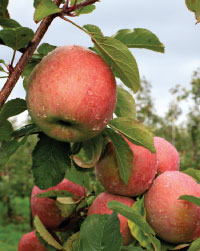Soil & Sea: reports from our producers
This article was originally published in October 2013

Northwest apple growers are excited about a new apple variety being developed at WSU called WA 38. It reportedly is very crisp and juicy, with a lot of sweetness. It won’t be planted commercially until 2016.
California Haas avocados usually weigh half a pound or more, but this summer, hundreds of thousands of trees in Southern California produced the tiniest avocados in local memory. By most accounts, the fruits are about 30 percent smaller than usual.
The main reason reportedly is a very unusual growing year that consisted of low winter rainfall in early 2012 (avocados spend more than a full year developing on the tree), erratic bee activity during the late spring bloom period, and lots of unseasonably cool and cloudy weather.
Northwest farmers have started growing quinoa but say they have a way to go before they can see consistent, low-risk production happening on the Palouse or elsewhere in the Northwest. Obstacles include sufficient seed and processing resources.
Oregon hazelnut growers could see higher prices and increased demand for their nuts this year. That’s because California almond harvests are expected to be down, so consumers may substitute hazelnuts for pricy almonds. Also helping Oregon growers is the fact that Turkey — the largest hazelnut producer — will produce 100,000 fewer tons than last year.
Vegetarians aren’t the only ones buying tempeh, tofu and seitan, a survey finds. Sales of meat alternatives climbed 8 percent between 2010 and 2012, thanks in part to meat eaters looking for a break from meat.
Shrimpers were happy with the high prices they got for their brown shrimp catches last summer in waters off Texas. That’s mainly due to the sharp drop in imports from disease-ravaged shrimp farms in Southeast Asia, especially Thailand, the largest single shrimp supplier to the U.S. market.
